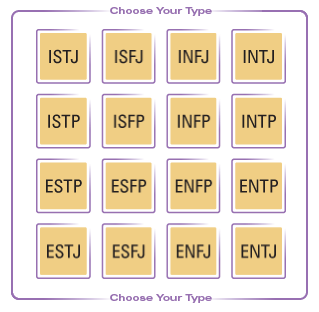Source: Ed Batista
Tag: test
Who are you in stressful situations?
We’ve all taken the Myers-Briggs Type Indicator (MBTI) personality profiling test. (If you haven’t, check it out here or take a Free Personality Test here: 16 Personalities): The letters stand for:
- The first letter is “I” or “E”: “Introversion” or “Extraversion”.
- The second letter “S” or “N”: “Sensing” or “Intuition”.
- The third letter “T” or “F”: “Thinking” or “Feeling”.
- The fourth letter “J” or “P”: “Judging or “Perceiving”.
MBTI has nailed my personality profile and does so again below in how I react in stressful situations:
INFP: diligently ignores problem until it’s too big to manage
ESTJ: ‘exactly as i say, or else’
ISFP: lists and lists and lists and lists…
ESFJ: vocalizes everything they’re doing
ISFJ: ♫ move b*tch, get out the way ♫
ENTP: too interested by the options to do anything
ISTJ: cool headed, but harsh like ice
ENFP: heart rate over 9000
INTP: never does anything despite completely understanding the problem
ENTJ: step aside or get crushed underfoot
ISTP: nothing like a full-blown crisis to get back into the zone
ENFJ: assumes responsibility and approaches with logic
INFJ: adrenaline rush or complete paralysis
ESTP: acts first, figures out later
INTJ: devises a universal system to resolve the problem for all time
ESFP: needs space to figure things out
Source: Sixteentypes. Image – Meyersbriggs.org
Take the test. How do you measure up?
91 total points. (If you are higher than 45, you are a Maximizer.)
“Most people fall somewhere in the middle.”
“Maximizers” like to take their time and weigh a wide range of options—sometimes every possible one—before choosing. “Satisficers” would rather be fast than thorough; they prefer to quickly choose the option that fills the minimum criteria (the word “satisfice” blends “satisfy” and “suffice”).
“Maximizers are people who want the very best. Satisficers are people who want good enough,”
“Maximizers landed better jobs. Their starting salaries were, on average, 20% higher than those of the satisficers, but they felt worse about their jobs.”
“Satisficers also have high standards, but they are happier than maximizers, he says. Maximizers tend to be more depressed and to report a lower satisfaction with life”
My Score: 60. (Oh Boy)
Read full article in wsj.com: How You Make Decisions Says a Lot About How Happy You Are
Crave Ice cream? Like no other man. Addicted? Not!
Join me in taking the NY Times Magazine Quiz: Are You Addicted to Food?
Part A: Answer 0 for never; 1 for once a month; 2 for two to four times a month; 3 for two to three times a week; and 4 for more than 4 times a week.
-
I find myself consuming certain foods even though I am no longer hungry. (DK Score: 4. Actually 4×4=16, if we are asked to uphold a Monk-level integrity standard here. I could eat ice cream 3 meals a day.)
-
I feel sluggish or fatigued from overeating. (DK Score: 2. Shocking actually. I think I have built up a gorging stamina.)
-
I have had physical withdrawal symptoms like agitation and anxiety when I cut down on certain foods (not including caffeinated drinks). (DK Score: Hmmmm. What if your normal condition is being agitated and anxious? Let’s split the baby here and give me a 2.)
-
My behavior with respect to food and eating causes me significant distress. (DK Score: 1. I’m should get “negative” points here. Eating actually brings me incredible joy and peace. That is, until my pants begin to snug up. Then we’re talking sirens.)
Continue reading “Crave Ice cream? Like no other man. Addicted? Not!”
The “Boredom” Test…
 Brainpickings.com shared a post on the Anatomy of Boredom. I’m drawn to personality self-tests like a moth to flame. This test boosted the ole’ psyche this morning: My Score – 79. (Naturally that led me to think that there is something wrong with me if I’m such an outlier with my great score.) Check out the entire post to find what researchers say a high or medium boredom score means for you.
Brainpickings.com shared a post on the Anatomy of Boredom. I’m drawn to personality self-tests like a moth to flame. This test boosted the ole’ psyche this morning: My Score – 79. (Naturally that led me to think that there is something wrong with me if I’m such an outlier with my great score.) Check out the entire post to find what researchers say a high or medium boredom score means for you.
The statements to follow can be answered using a 7-point scale — from ’1′ (highly disagree), to ’4′ (neutral), to ’7′ (highly agree).
To find out your own proneness to boredom, add up the total of the scores you gave each question and see results below:



